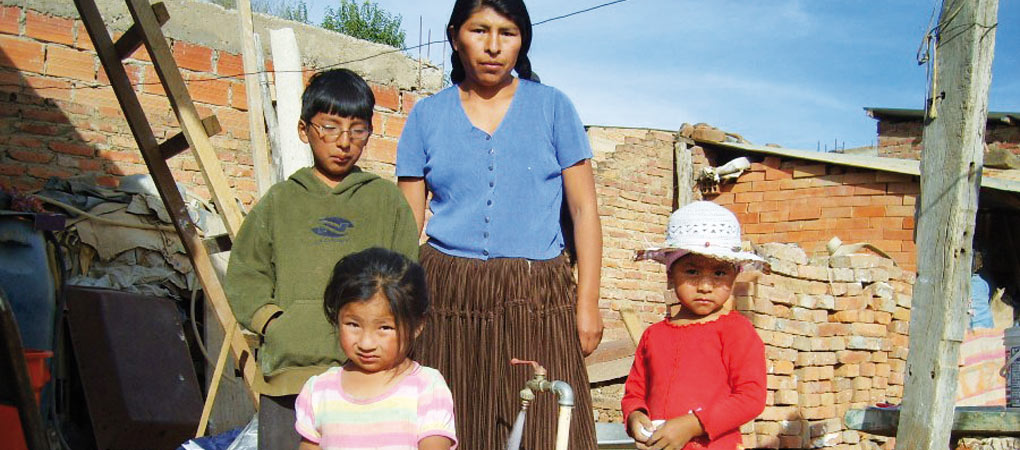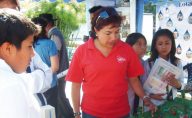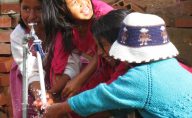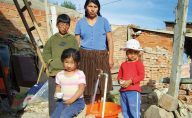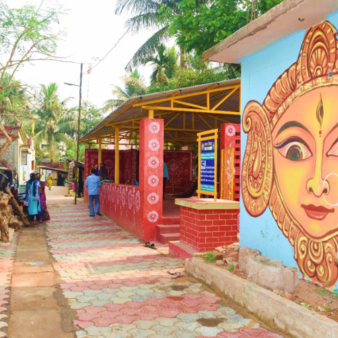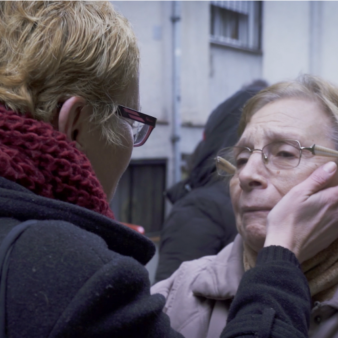The Water Solutions through Collective Management project works to extend access to affordable water in peri-urban areas of Cochabamba, Bolivia through an innovative public-private-community partnership. Initiated in 2003 by Bolivian NGO Fundación Pro Hábitat, the project involves the community-managed supply and distribution of potable water and water committees with democratically elected members have been established within each community to manage the water systems. A revolving fund has been established to enable residents to access micro-credit loans and all project costs are met by the local communities.To date, the project has benefitted 1,709 families from eight different communities in the South Zone of Cochabamba.
Project Description
Aims and Objectives
- To improve the quality of life of families living in peri-urban settlements in Cochabamba by ensuring access to clean water and basic services.
- To provide support to communities as they design, build or supervise the construction of alternative community-based systems of water distribution, strengthening the capacities of community members and leaders so that they can manage the water systems in a democratic, transparent, efficient and sustainable manner.
- To provide an innovative and viable alternative to the public-private partnership model promoted by water privatisation entities, including the community as a key partner in the process.
Context
The South Zone of the city of Cochabamba has approximately 100,000 inhabitants (one-fifth of the city’s population). With an average per capita income of US$0.91 per day, it is the area of highest demographic growth in the municipality and is home to the majority of destitute migrants from the neglected highland regions of the country. Only five per cent of households in the area have domestic running water. The vast majority of families in the South Zone purchase water from tankers and store it in 250-litre metal water tanks, paying up to 20 times more for their water than middle- and high-income households in the Central and North Zones of the city who have piped water supplied by the municipal water company. Due to the high cost, residents of the South Zone consume minimal amounts of water. In addition, the exact source of the water is unknown and it is vulnerable to contamination. Partly as a result of both the poor quality and low quantities of water consumed, the rate of infant mortality in the area is between 94 and 114 per thousand, compared to 78 per thousand in the city as a whole.
In Cochabamba there was a violent backlash against an attempt at privatisation of the main water utility in 1999 and 2000. These protests or ‘water wars’ in Cochabamba forced the national government to rethink its policy on water privatisation and ultimately led to the retraction of a number of large concessionary contracts. Water provision is still a potent social issue in Bolivia. The SEMAPA Municipal Water Service is the public company responsible for the provision of potable water and sanitation in the city of Cochabamba. The municipal piped water networks, however, do not cover all areas of the city. There is almost total absence of public water services in the South Zone, affecting hundreds of neighbourhoods and thousands of residents. Plans for the expansion of networks and services to the South Zone were initiated in 2005, but progress has been very slow.
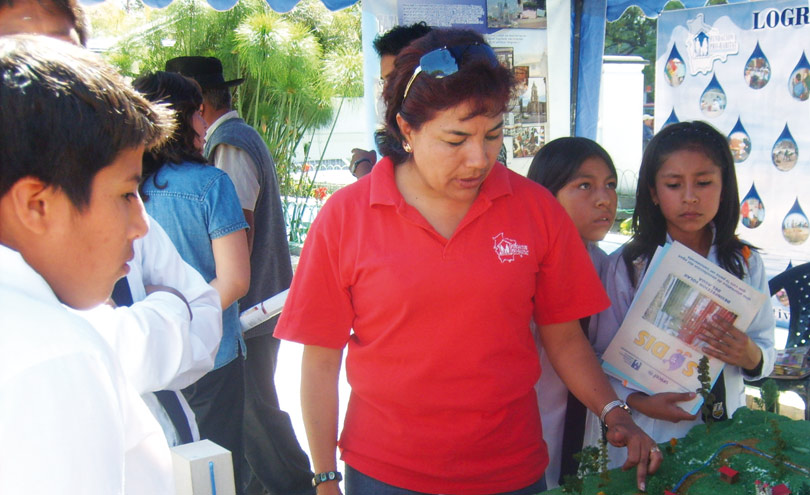
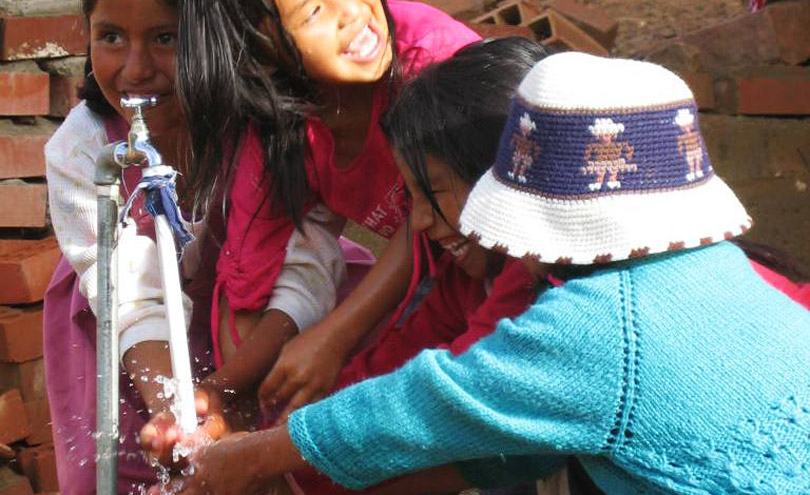
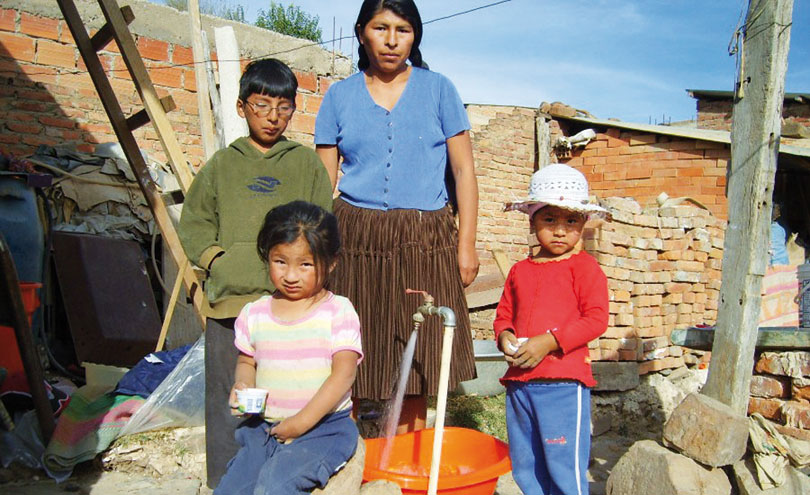
An initial participatory diagnosis carried out by Fundación Pro Hábitat in collaboration with the Instituto de Formación Femenina Integral (IFFI), the SODIS water purification project and four communities in the South Zone showed that 44 per cent of children suffered from malnutrition due to the high levels of acute diarrhoeic illnesses, 100 per cent of interviewed families consumed contaminated water and 99 per cent of the population lacked bathrooms in their homes. In this context, the project was initiated.
Key features
Initiated in 2003, this project involves the community-managed supply and distribution of water through an innovative partnership between an NGO (Pro Hábitat), the municipal water company (SEMAPA), a private company (Agua Tuya pipe manufacturer) and local communities to extend access to affordable water in peri-urban areas of Cochabamba, Bolivia.
Water committees have been established within each community to manage the projects and its members are democratically elected. The Agua Tuya pipe manufacturing company constructs secondary piped water systems on behalf of the water committees, while coordinating with SEMAPA so that the systems meet the required standards and can be connected to the main water pipelines in future. Costs are met by the local communities through micro-credit loans provided by Pro Hábitat through a revolving fund to finance the cost of construction, which are then repaid by residents in twelve monthly instalments.
Each system includes a community water tank that is filled with water from tankers. The tank is situated in a high location and the distribution takes place through gravity via a secondary piped water system to each individual household. Each household is supplied with an individual connection and a water meter and families can subsequently extend the system (i.e. to different rooms in their homes) as and when they are able to do so.
The water committees are responsible for the management and maintenance of the system, as well as reading the meters and collecting payment from each household for the water consumed. Residents are trained in a range of areas, including management of the water systems, the appropriate use of water resources and solid waste management. The project has benefitted 1,709 families to date, from eight different communities in the South Zone of Cochabamba.
This is not an isolated project for water provision, but rather a continuous process to improve living conditions: once the water issue is resolved, families have begun to improve their homes, building bathrooms and kitchens. By combining its partners’ resources, the project overcomes the problem of the prohibitive costs of new secondary water connections, and reduces end-user water cost by over 60 per cent. In addition, by embedding the participation of the people directly in water provision, the partnership has created socio-political stability in an area known previously for its volatility.
Covering costs
The costs of the water systems were covered 100 per cent by the residents. Total capital costs for the construction of the water systems were US$174,850, of which US$35,000 was the initial cash payment made by residents and the remaining balance of US$139,850 was provided through loans from Pro Hábitat, repayable in twelve monthly instalments. Interest rates are 12 per cent (compared to 18 per cent for commercial loans), with affordable instalments of US$10-13 per month. Residents are also responsible for the costs of the ongoing management of the project and maintenance of the water systems.
Funding for Pro Hábitat’s work in capacity building, technical assistance and monitoring has been provided by a range of donor agencies at different stages of the project, including Homeless International, MISEREOR and Oxfam GB, as well as the organisation’s own revolving fund.
Impact
- Communities have been empowered and strengthened, with high levels of participation in decision-making and the ability to negotiate with local authorities. Women in particular have been empowered through the process and have taken on leadership and support roles within the community and water committees.
- In addition to having access to safe, potable running water at a much lower cost than previously, some residents have subsequently been able to build their own kitchens and toilets, either with their own resources or through loans from Pro Hábitat, thus improving their living conditions.
- Through the project, residents have improved their water storage systems, helping to avoid evaporation and contamination. Residents are able to consume safe drinking water in larger quantities than previously, with improved levels of hygiene.
- At municipal level, inter-institutional networks have been formed and are working together to address the issue of water shortage in the region. Following the implementation of the project, the municipal government has set aside resources to fund similar projects and included the community-based construction and implementation of water systems in its Annual Operative Plan.
- The national government has begun to provide support for the construction and implementation of potable water systems directly to community-based organisations, without the need to have NGOs as intermediaries.
Why is it innovative?
- The project involves an innovative public-private-community partnership between an NGO, a municipal water company, a locally-based private company and the local community, with community control of the process. This partnership is innovative in terms of both funding for infrastructure and management of services, and provides a viable alternative to the public-private partnership model promoted by water privatisation entities.
- Capacity building of the water committees in management of the water systems and other administrative aspects ensures the sustainability of the process.
- The water distribution systems were developed according to the geographic conditions of each community and designed so as to facilitate connection to the main network in future.
- The project involves an innovative funding system that combines public-private investment with community resources and micro-credit through a revolving fund.
- This collaborative approach to funding and management of water systems that has been developed in Cochabamba is in accordance with a vision of water as a public asset and access to water as a human right and, in contrast to existing international policies that promote the establishment of private service providers, contributes tangible experiences that present a viable alternative to the international debate.
What is the environmental impact?
Pro Hábitat has a policy of using locally-sourced, low-cost materials and appropriate technologies in all of its housing construction and improvement projects. The project uses locally manufactured high density polyethylene (HDPE) pipe, which is highly durable, provides protection from contamination and requires significantly less energy to fabricate, transport and install than other pipe materials. In addition to ensuring access to affordable, potable water for low-income households previously without domestic running water, families are trained in the importance of the appropriate use of water as a precious and scarce resource. Pro Hábitat is currently developing an initiative for the collection and reuse of greywater for irrigation purposes. The project carries out regular ‘clean-up’ campaigns and initiatives for solid waste management, as well as educational events on themes relating to contamination, water, housing and habitat. The project has highlighted the need for adequate drainage systems in the region, an issue which is now being addressed by the municipality and a range of other institutions.
Is it financially sustainable?
MISEREOR has renewed its support to Pro Hábitat to continue and expand the project in the coming years. The organisation has also secured funding from SELAVIP to support participating households in the construction of toilets. The national government has now begun to provide funding for other communities to develop their own water systems.
Under normal conditions, community members would need to pay the municipal water company US$215 in order to be connected to the water distribution network and the company owns the network. Through the project each household invests between US$120 and US$156 and is a shareholder in the system, giving them greater negotiating power with SEMAPA. When the main water pipeline is finally brought to the communities by SEMAPA, residents will not need to make additional payments, as the secondary networks built through the project will be used and connected to the main pipeline.
One or two members of each community are paid to read the household water meters and collect payment from families for the water consumed. In addition, thirty-two people from participating communities have been trained as plumbers. They now work independently, providing their professional services to the community.
As a result of the project, the cost of water to residents has been reduced by over 60 per cent. Micro-credit loans provided by Pro-Hábitat have allowed families to extend their homes (e.g. building kitchens and toilets), as well as enabling them to pay for the water systems. Monthly instalments are affordable at US$10-13 per month and repayment rates over the one-year period are 100 per cent.
What is the social impact?
A key focus of the project has been to strengthen community organisation and cooperation. From the beginning, the local communities have been responsible for the management of the project, through existing leadership structures and new leaders elected specifically to the water committees. Throughout the process, decisions were made through community assemblies, with the participation of all residents. The democratically elected members of the water committees represent the communities in negotiations with SEMAPA and the local authority. The role of Pro Hábitat in the process has been to strengthen the organised communities, build capacity and support the communities and leaders in all actions they decide to undertake.The participation of women in leadership positions is actively encouraged. Women represent 40 per cent of leaders of the water committees and women’s participation in community assemblies relating to the water systems is 37 per cent, compared to 15 per cent participation of women in general community assemblies and decision-making processes.
The process of organisational strengthening enabled the communities to negotiate subsequent projects with the local authorities, such as the provision of sanitation infrastructure and services.
Barriers
- One of the first barriers encountered was the scepticism and lack of trust on the part of some of the communities. The water problem in Cochabamba dates back over 40 years and has been used many times as a political instrument. Many leaders have promised water projects in campaigns and elections, which were never carried out. In order to overcome this, Pro Hábitat worked with the community leaders, explaining in community assemblies the possibilities, risks and responsibilities associated with the project and using its politicial impartiality to regain the trust of the residents.
- Many of the communities were involved in internal power struggles and political divisions. As a result, certain groups within the community refused to take part in the project. Pro Hábitat decided to carry on with the project with those residents who wished to be involved, leaving open the possibility for others to join at a later date. As the project progressed, many of those initially opposed to the project decided to become involved.
- Insufficient resources to satisfy the demand meant that Pro Hábitat was unable to reach all of the communities in need of potable water who wanted to be involved in the project. There has been a positive outcome in this case, however, as the national government has made resources available for these communities to develop their own systems.
Lessons Learned
- It is important to get the right team together in the early stages of the project and to avoid an overload of tasks.
- For every project relating to the provision of services or access to housing, there should be a strong socio-political component – in addition to the technical and financial aspects, and of equal importance.
- Collaborating with other groups and organisations, where each is able to contribute to the project within it its own area of expertise, will strengthen the project.
- A new project should only be initiated once there is acceptance by the majority of the population, and it is important to keep open the possibility for additional households to join if and when they wish to do so. Decisions should not be forced and if there are strong divisions within a given community it is best to cease activity and wait until a consensus is reached.
Evaluation
- A comprehensive technical evaluation was carried out with Agua Tuya during the implementation of the project and the project is evaluated by its funders at three- to six-month intervals, with internal auditing and evaluation each year.
- A follow-up of the financial management process of the water committees was carried out with funding from Pro Hábitat and the Bolivian Centre for Information and Documentation (CEDIB) and ongoing monitoring of the social development process is carried out by the local communities and Pro Hábitat.
Transfer
- Pro Hábitat began the project with one community in Cochabamba in 2003 and has since expanded its work to eight communities, reaching a total of 1,709 families. In partnership with SELAVIP, Pro Hábitat is now beginning a complementary project, providing technical and financial support to these communities in the construction of individual toilets in their homes.
- The approach has been transferred to an additional 36 communities in Cochabamba, using national government funding.
- A similar project has been set up in the city of Santa Cruz involving Aguas del Este and other similar projects are being funded by the Swiss Development Cooperation (COSUDE) in El Alto.

